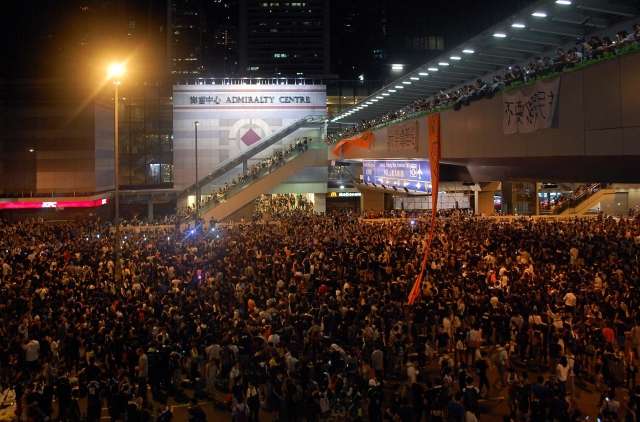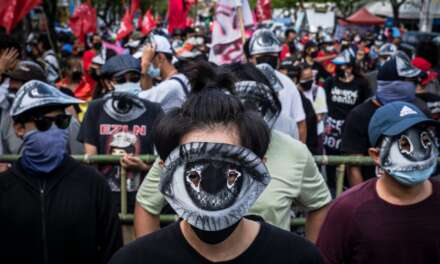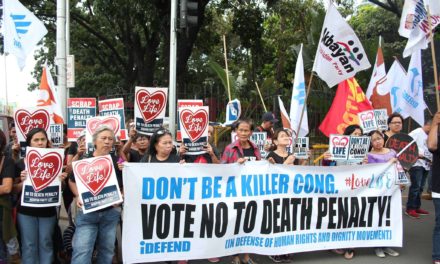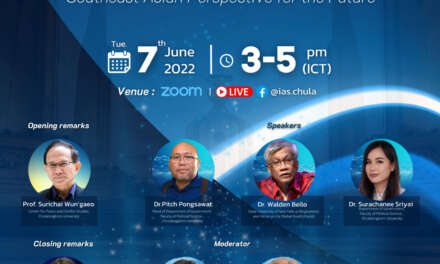The protest in Hong Kong, which is now in its fifth day and was started by the Occupy Central with Love and Peace group that preceded the current mass mobilization, could turn out to be a game-changing social movement. Many local and foreign human rights groups fear that what began as a call for the right to independent suffrage could lead to a crackdown similar to what happened in Tiananmen Square in Beijing 25 years ago if it escalates and becomes violent.
The protest was sparked by Beijing’s decision in August to limit voter choice by allowing only Communist Party-approved candidates to run in Hong Kong’s 2017 election for the Chief Executive. An editorial in the People’s Daily, the official newspaper of the Communist Party of China, warned on Thursday that Hong Kong could succumb to chaos and that those who continue to participate in the protests should expect dire consequences. Many recall that the newspaper issued a similar warning before the brutal attack at Tiananmen in 1989, when police killed hundreds of students and workers that demonstrated and called for democracy.
At present, the Hong Kong government’s strategy is to “wait it out” because some of the protesters’ demands, especially on the reconsideration of the elections, are deemed unrealistic by the majority of Hong Kong citizens. Since the weekend, tens of thousands have occupied the commercial areas of Central Hong Kong. The majority of the protesters – at least 70 percent – are students. Hong Kong’s political landscape is healthier than that of Mainland China, due to the presence of an independent judiciary, greater civil liberties for residents, and a stronger tradition of free speech.
The most likely victory if the protest gets bigger is a resignation by current Hong Kong Chief Executive Leung Chun-ying. This could happen if more people join the demonstration and if it continues, because the majority will see him as corrupt and too much a lackey of the mainland.
Critical Moment
The critical moments are early Friday morning and next Monday morning, because both are working days. The police are now looking for a “reason” for repression, and the protesters’ violation of the law is already being mentioned. Student organizers claim they will take action soon and occupy the government headquarters. If this happens, it could legitimize repression. Repression could also occur if the protesters become divided and their numbers thin out because they are too tired or frustrated.
Some activists from Hong Kong think that if they remain peaceful, it is less likely that the People’s Liberation Army will be mobilized, because it concerns the international image of Chinese leader Xi Jinping. The use of tear gas by police at the beginning of the Occupy event was widely condemned, as it already had a substantial impact on Hong Kong’s image, with lots of pictures in the international press.
It is widely believed that the Hong Kong government will use other tactics to divide people, including mobilizing their supporters (local pro-Communist Party figures, businessmen, civil servants, mainland Chinese migrants and some ultra-rightists). They will make public complaints to the organizers of the Occupy events over the protesters’ interruption of government services, blocking of traffic, and business losses due to slowdowns in factories and tourists shying away.
A new generation of democracy activists
The unprecedented occupation last Monday of four major districts in Hong Kong involving at least 80,000 people was the largest student demonstration and occupation of Hong Kong in the history of collective action in the territory. The main bulk of those in the streets braving the tear gas thrown by police were youth and students. Three major arteries were affected by the occupation: Admiralty, Central, and parts of Wan Chai, which contains the majority of business and government buildings including the headquarters of the 6,000-strong Hong Kong garrison of the People’s Liberation Army of China. Multiple barricades set up by students closed down Causeway Bay (Hong Kong’s busiest shopping neighborhood), as well as Mong Kok and Jordan (Nathan Road) across the harbor in Kowloon, which are the most densely populated districts in the world.
The protest is supported but not led by the veterans of Hong Kong democracy movements like the three leading liberal academics and clergymen who first suggested an occupation a year earlier. Participants rejected the September 28 proposal by the Hong Kong Federation of Students, which also led a movement last weekend to withdraw in view of the threat of crackdown.
The issue of economic inequality is also coming to the fore. Trade unions and civil society groups released a joint statement demanding genuine universal suffrage and also regulations on working hours and a universal pension. Although student organizations are showing greater dynamism now, they must develop a stronger link with the general public and more support from other networks.
According to the protesters’ demands:
1. Leung Chun-ying and Hong Kong government officials must apologize to the people for the heavy-handed measures employed by the police against peaceful protesters, and Leung must step down;
2. The National People’s Congress (NPC) resolution must be withdrawn and genuine universal suffrage and civic nominations must be implemented;
3. Regulations on working hours, a universal pension and collective bargaining rights must be implemented.
The long holiday helped sustain the protest, however next week will be a return to normal working schedules, so it will be interesting to see if the protest holds. According to Edna Aquino, a Filipina human rights activist based in Hong Kong, there is local business support but it is still difficult to determine who these local supportive tycoons are and how deep will they dig from their pockets. Local tycoons are supportive because they favor a liberal democratic Hong Kong. Transnational corporations will not likely support the protest, because they will be affected if and when stock prices go down.
The protest is now being called the “Umbrella Revolution,” after the umbrellas that were seen in news images massively shared on social media – they were used by protesters as protection against tear gas, along with goggles and plastic wrap. It has so far paralyzed transportation, disrupted businesses and schools, and temporarily changed daily life in Hong Kong. The Hong Kong Confederation of Trade Unions called for a strike, and has received messages of solidarity from partners in the region and beyond. Workers that did not join the strike showed their support by joining the protest after their shifts. The occupation of main streets slowed down activities in workplaces and discussions are happening.
Solidarity events have been held in at least 64 cities worldwide since Tuesday, and many participants also carried umbrellas. In London and New York, exiled Chinese activists and veterans of the 1989 Democracy Movement joined the crowd.
Warning from Beijing
The Chinese government, Hong Kong’s government and the majority in the business sector view the protests as a disruption and accuse a small groups of unlawful individuals of inciting the crowd. There are jitters as well about economic consequences if the unrest continues. Hong Kong is one of the centers of global finance, and the backlash may affect not just the local government, but also financial and economic actors.
For Beijing, the continuing protest is dangerous as it inspires more dissent on the mainland despite government attempts to censor the media and block discussion of the events. According to some civil society groups, the Chinese government has already detained and intimidated dozens of people on the mainland for expressing support for the protesters in Hong Kong on social media.
Hong Kong was a British colony until China resumed sovereignty in 1997 and is governed by a mini-constitution known as the Basic Law. Since then, China has maintained a policy of “one country, two systems.” The National People’s Congress (NPC) passed a resolution agreeing that the Hong Kong Chief Executive would be elected by universal suffrage in 2017. Since the handover, people in Hong Kong have been calling on the Hong Kong and Chinese governments for democratic elections. China broke its 2007 promise with the NPC’s plan on August 31 that Beijing would ensure control in future elections of the Hong Kong Chief Executive by means of a nomination committee. A number of abstract, unreasonable criteria for the candidacy were laid out, including patriotism and loyalty subject to Beijing’s interpretation.
It is highly unlikely that Beijing will give in to the demands of protesters. It never buckles in the face of protests. The migrant workers, a strong pillar of Hong Kong’s economy, are supportive of the protests and have already issued a statement. Foreign embassies in Hong Kong were already warned by China that migrants joining the protests will also be dealt with severely.


![[Analysis] Deconstructing a dismaying outcome](https://focusweb.org/wp-content/uploads/2022/05/tl-deconstructing-a-dismaying-outcome-440x264.webp)







